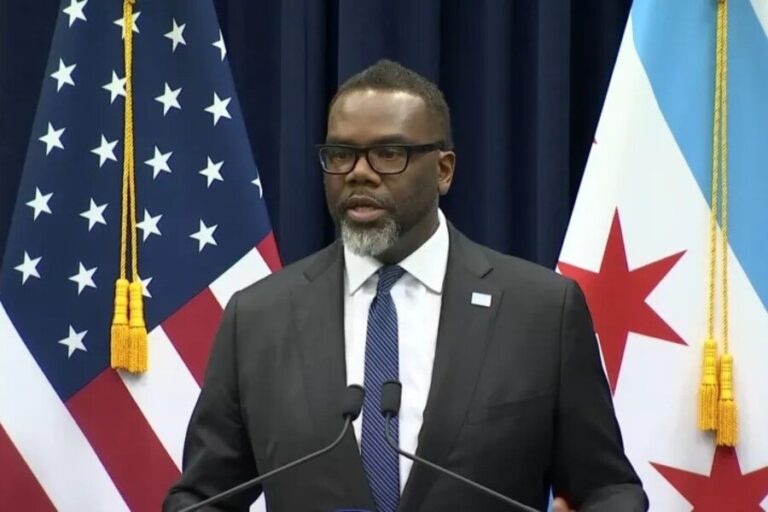In a significant political development, Mayor Brandon Johnson has agreed to testify before Congress on March 5 regarding Chicago’s status as a sanctuary city for undocumented immigrants. The hearing, called by House Oversight Committee Chairman James Comer (R-KY), will include testimony from the mayors of other major cities with similar policies, including Boston, Denver, and New York.
The Oversight Committee is investigating the impact of sanctuary city policies on public safety and federal immigration enforcement. Comer has criticized these policies, claiming they prioritize protecting undocumented immigrants over the safety of American citizens. He also accused sanctuary jurisdictions of obstructing U.S. Immigration and Customs Enforcement (ICE) operations by refusing to cooperate with federal authorities.
Comer’s letter to the mayors requested all documents and communications related to their cities’ sanctuary policies. On Wednesday, Comer confirmed via a statement on X (formerly Twitter) that all four mayors had agreed to testify.
“Sanctuary mayors have prioritized criminal illegal aliens over the American people,” Comer wrote. “These reckless policies have led to too many preventable tragedies and endanger ICE agents who must take riskier enforcement actions. We will press these mayors for answers and examine measures to enforce compliance with federal immigration law.”
Chicago, like many other sanctuary cities, has enacted laws that limit when local law enforcement can cooperate with federal immigration authorities. The Welcoming City Ordinance and the Illinois TRUST Act prohibit police from arresting or detaining someone solely based on their immigration status. Under these laws, city services and benefits cannot be denied based on a person’s citizenship status. The TRUST Act further restricts cooperation with ICE detainers unless a federal criminal warrant is issued.
In response to Comer’s criticisms, Johnson has strongly defended these policies, emphasizing Chicago’s long-standing commitment to being a sanctuary city. Last month, he reiterated the city’s dedication to protecting the civil and human rights of all residents, including undocumented immigrants.
“Regardless of who’s in the White House, Chicago is a city that opens its arms to people from around the globe,” Johnson said. “We will continue to protect civil and human rights, and we welcome all individuals and families who want to work, live, and thrive here in our beloved city.”
Johnson’s decision to testify before Congress marks a shift from his earlier hesitance to engage with Comer’s request. Initially, Johnson described the invitation as “disingenuous” and expressed doubts about whether the hearing would provide a constructive forum for meaningful dialogue. However, he later indicated that his office was collaborating with the mayors of Boston, Denver, and New York to prepare for the hearing and review the document requests.
“We’re coordinating with three other cities,” Johnson said earlier this week. “They didn’t just ask for the city of Chicago; there are a series of documents they are requesting. We’re working with our legal team to ensure we comply with the process.”
The city’s Corporation Counsel, Mary Richardson-Lowry, added that Chicago intends to cooperate without unnecessary obstruction. “We’ll be discussing with the committee what they’ve specifically requested from us, and we don’t anticipate being obstructionist in any way,” she said.
The hearing comes amid a broader national debate over immigration enforcement. ICE detention facilities have reportedly reached 109% capacity, with nearly 42,000 migrants currently in custody. According to internal Department of Homeland Security data obtained by CBS News, many of those detained were apprehended at the U.S.-Mexico border following a surge in arrests under President Trump’s immigration policies. ICE acknowledged that its enhanced operations have led to a significant number of arrests, putting additional strain on detention resources.
Meanwhile, some critics have expressed concern that political attention on sanctuary cities detracts from addressing urgent issues related to immigration reform and humanitarian needs. For sanctuary cities like Chicago, policies are designed not only to protect undocumented immigrants but also to foster trust between immigrant communities and local authorities.
Advocates argue that cooperation between law enforcement and federal immigration agencies can deter undocumented individuals from reporting crimes, seeking medical care, or accessing essential services due to fear of deportation. Sanctuary policies aim to mitigate this fear by ensuring that local police prioritize public safety over immigration enforcement.
Boston Mayor Michelle Wu, who also confirmed her attendance at the hearing, echoed these sentiments. “We are committed to protecting all of our residents,” Wu said. “Our policies reflect our values as a welcoming city.”
Despite criticism from Republicans, many Democratic leaders remain steadfast in their support for sanctuary policies, framing them as a matter of human rights and social justice. However, the Trump administration has threatened to withhold federal funding from sanctuary cities, a move that has sparked legal challenges and further polarized the immigration debate.
CNN reported that newly sworn-in Attorney General Pam Bondi is working on initiatives to pause federal funding for cities that do not comply with federal immigration enforcement efforts. This has raised concerns among local leaders about the financial impact such measures could have on municipal programs and services.
For Johnson and his counterparts, the upcoming congressional hearing represents an opportunity to defend their policies on a national stage. It will also serve as a platform to push back against narratives that frame sanctuary cities as havens for criminal activity.
“We are a welcoming city, and we are proud of that work,” Johnson said. “We will continue to protect the interests of all working people in this city. This conversation is about ensuring safety and opportunity for everyone, regardless of their immigration status.”
The March 5 hearing is expected to draw significant attention from lawmakers, media, and advocacy groups on both sides of the immigration debate. As Johnson prepares to make his case in Washington, his testimony will likely highlight Chicago’s broader commitment to being a sanctuary city and the importance of upholding policies that reflect the city’s values.
